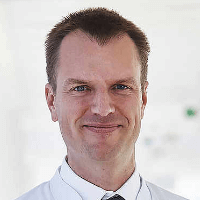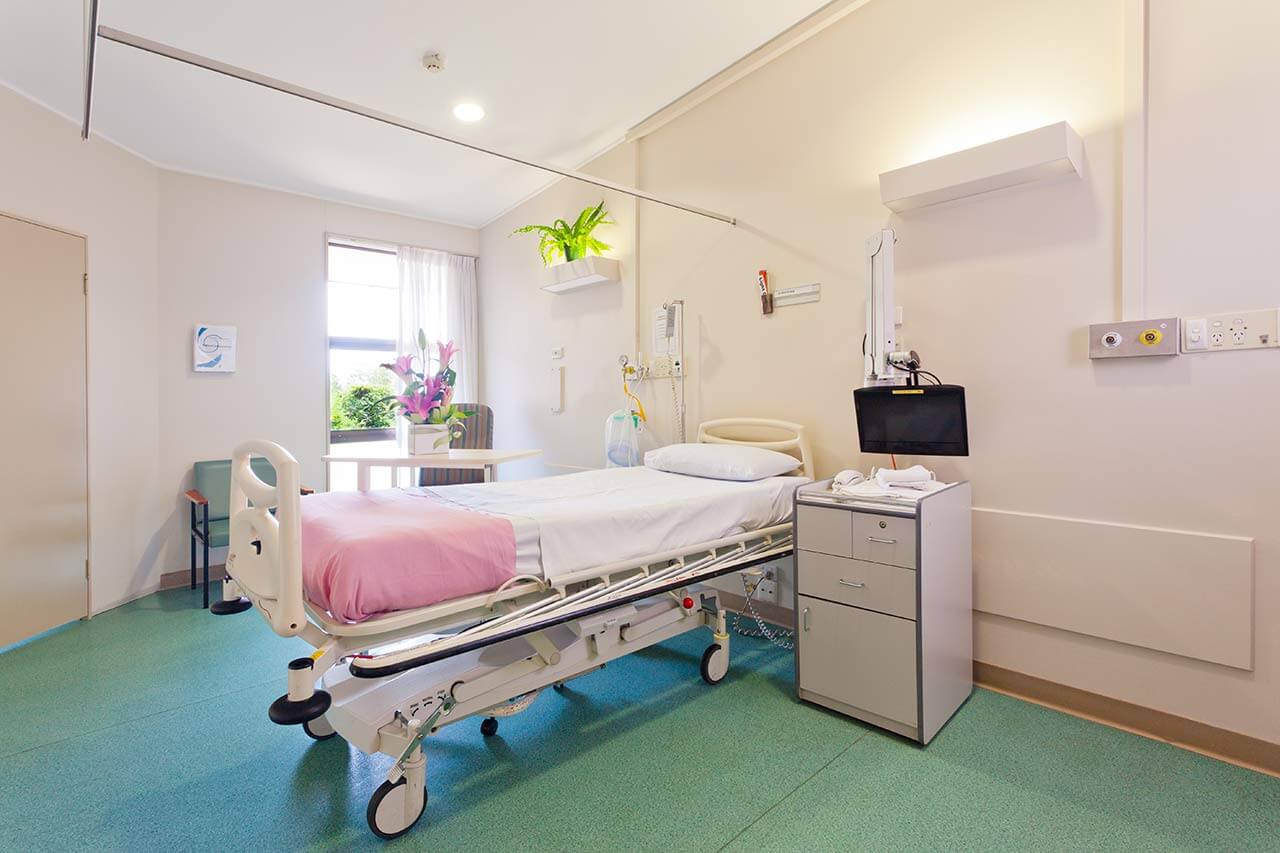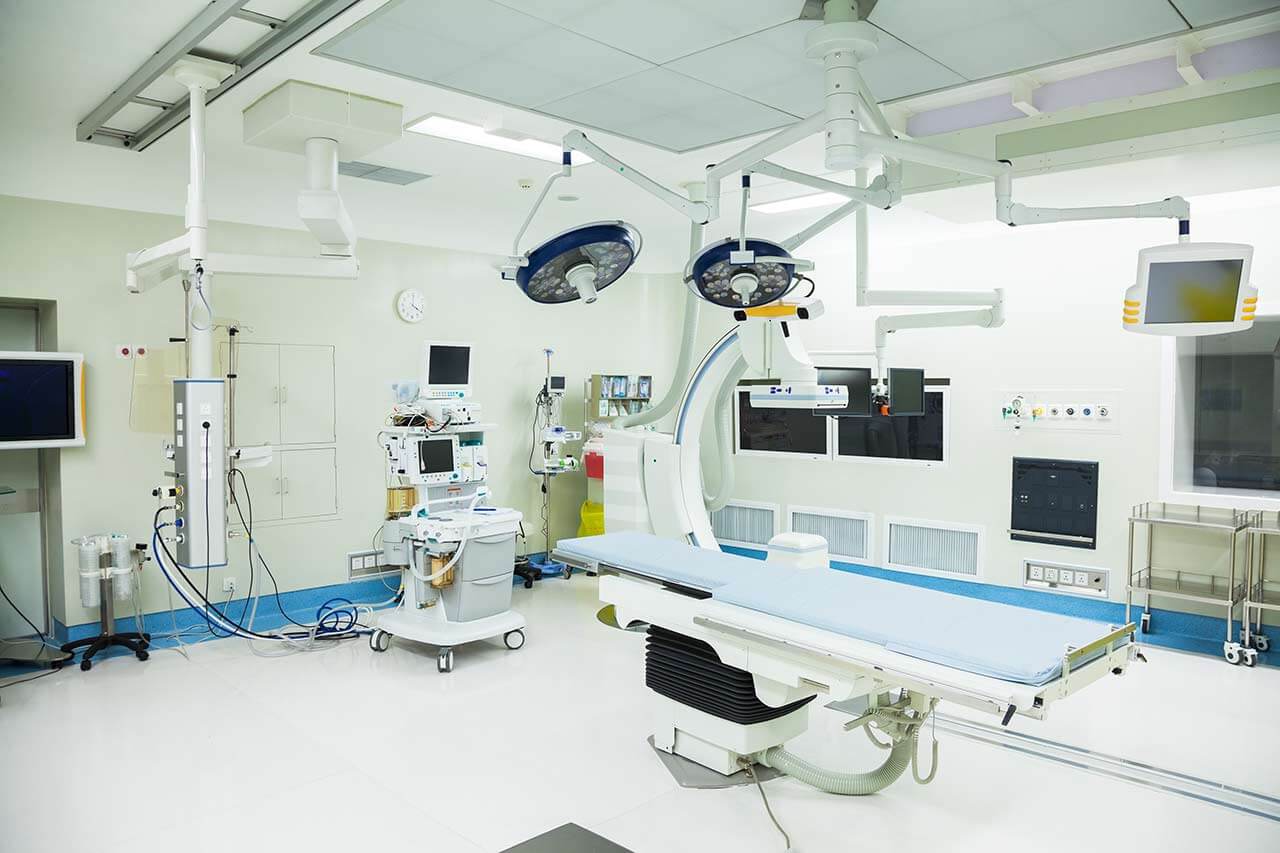
The program includes:
- Initial presentation in the clinic
- clinical history taking
- physical examination
- general blood and urina analysis:
- complete blood count
- general urine analysis
- biochemical analysis of blood
- TSH-basal, fT3, fT4
- indicators of inflammation
- indicators blood coagulation
- MRT angiography of the head and neck
- neurological examination
- neuropsychological tests (on indications):
- ENMG (electroneuromyography)
- EEG (electroencephalography)
- SEPs (somatosensory evoked potentials)
- VEPs (visually evoked potentials)
- BAEP tests (brainstem auditory evoked potential)
- preparation of pre-operational standard
- chirurgical treatment with cutting muscles or nerves
- symptomatic therapy
- full hospital accommodation
- cost of required medications
- nursing staff services
- elaboration of further recommendations
Required documents
- Medical records
Service
You may also book:
 BookingHealth Price from:
BookingHealth Price from:
About the department
The Department of Neurosurgery at the Hospital Bogenhausen Munich offers the full range of services in the area of its specialization, and also has a reputation of the largest and leading medical facility of this kind in Germany. The department's medical team successfully performs surgical interventions to treat brain and spinal diseases. The surgeons annually perform more than 2,500 operations of varying degrees of complexity in three high-tech operating rooms of the medical facility. The focus is on the treatment of brain and spinal cord tumors, traumatic brain injuries, spinal stenosis, spondylolisthesis, intracerebral hemorrhages and cerebral aneurysms. The fruitful research, as well as cooperation with the hospitals of the Ludwig Maximilian University of Munich and theTechnical University of Munich allow the department's specialists to offer patients the very latest neurosurgical treatment methods. The use of advanced computer systems and navigation devices guarantees the pinpoint accuracy of each surgical manipulation, which excludes damage to the vital anatomical structures of the brain and spinal cord. The department is headed by Prof. Dr. med. Jens Lehmberg.
For more than 30 years, the surgical treatment of brain tumors has been one of the department's priorities. When performing the surgical intervention, the department's specialists try to totally remove the tumor without causing damage to the healthy adjacent tissues in order to preserve important functions of the brain. The department performs brain surgery only using neuronavigation systems. It is neuronavigation devices that make it possible to identify the tumor boundaries with millimetre precision and avoid the removal of healthy tissues. The tumor can be imagined during surgery by staining with a fluorescent drug, which the patient takes prior to the procedure. As a rule, intraoperative monitoring is used to control the patients' condition. Thanks to neuromonitoring, the department's surgeons can remove tumors located near important regions in the brain or cranial nerves. The surgical resection of brain tumors in most cases is complemented by radiation therapy and/or chemotherapy. The doctors make a decision to carry out these types of therapy at the stage of treatment planning. In addition, an important component of the therapeutic process is psychological care for both patient and his relatives, since the detection of a brain tumor affects the patient's emotional state and can cause the development of depression or apathy.
The department's specialists are proud of their unique clinical experience and high success rates in the field of surgical treatment of spinal diseases: degenerative, traumatic, inflammatory and oncological pathologies of the cervical, thoracic and lumbosacral spine. Spinal surgery requires impeccable precision, and therefore the department's doctors widely use advanced three-dimensional navigation systems and robotic equipment in their clinical practice, which serve as a positioning tool and, in combination with the professionalism of the department's doctors, guarantee an optimal result. These techniques are mostly used for stabilizing interventions on the spine. The department's specialists often use minimally invasive interventions and microsurgical techniques, which require only a few small skin incisions of 2-3 cm. Such surgical interventions contribute to the absence of scars, minimal pain and quick postoperative recovery. The department's neurosurgeons also use minimally invasive surgery to treat spinal stenosis.
The treatment of traumatic brain injuries is also within the competence of the department's medical team. The patients with such injuries require close medical supervision using multimodal neuromonitoring, which includes recording blood circulation parameters, monitoring neurological status, oxygen partial pressure and brain temperature. In especially severe cases, the patients with traumatic brain injuries undergo microsurgical interventions, the main purpose of which is to stabilize the patient's condition and prevent brain damage.
The treatment of intracerebral hemorrhages and cerebral aneurysms is also of great interest. The use of innovative sparing treatments for these pathologies ensure minimal risks to the patients' lives and excellent treatment outcomes.
The main clinical focuses of the department include:
- Diagnostics and treatment of brain tumors (gliomas, meningiomas, pituitary adenomas, acoustic neuromas, lymphomas, etc.)
- Surgical removal of brain tumors using innovative neuronavigation systems and devices for intraoperative monitoring
- Chemotherapy
- Radiation therapy
- Spinal surgery (focus on the treatment of spinal stenosis and spondylolisthesis)
- Navigational surgery
- Robot-assisted surgery
- Minimally invasive surgery
- Microsurgical interventions
- Intervertebral disc replacement
- Stabilizing interventions using rigid and dynamic fixation structures
- Diagnostics and treatment of traumatic brain injuries
- Multimodal neuromonitoring
- Microsurgical interventions to stop bleeding and monitor intracranial pressure
- Intensive care (if indicated)
- Early rehabilitation (in collaboration with the Department of Neurology)
- Diagnostics and treatment of intracerebral hemorrhages
- Diagnostics and treatment of brain aneurysms
- Clipping
- Endovascular treatment with coil implantation (coiling)
- Intensive care (if indicated)
- Early rehabilitation (in collaboration with the Department of Neurology)
- Outpatient neurosurgical interventions
- Outpatient interventions for peripheral nerve compression syndromes (carpal tunnel syndrome, cubital tunnel syndrome)
- Outpatient interventions for back pain (facet joint denervation, periradicular infiltration, facet coagulation)
- Diagnostics and surgical treatment of other neurological disorders
Curriculum vitae
Professional Career
- Since 08.2018 Chief Physician of the Department of Neurosurgery at the Hospital Bogenhausen Munich.
- 06.2017 - 05.2018 Chief Physician of the Department of Neurosurgery at the Hospital Westpfalz Kaiserslautern.
- 05.2011 - 05.2017 Senior Physician with management responsibilities, Department of Neurosurgery, University Hospital Rechts der Isar Munich; key areas of work: skull base surgery, vascular neurosurgery, neuro-oncology and spinal surgery.
- 05.2006 - 04.2011 Senior Physician of the Department of Neurosurgery, University Hospital Rechts der Isar Munich.
- 06.2006 Board certification in Neurosurgery.
- 06.2001 - 04.2006 Assistant Physician, Department of Neurosurgery, University Hospital Freiburg.
- 08.1999 - 05.2001 Internship in Neurosurgery, Institute for Surgical Research, Working Group on Experimental Neurosurgery, University Hospital of Ludwig Maximilian University of Munich.
Academic Activities
- 2017 Extraordinary Professorship at the Faculty of Medicine at the Technical University of Munich.
- 2014 Master of Business Administration in Healthcare, University of Erlangen-Nuremberg (in-service clinical practice).
- 2009 Habilitation and PD title, Technical University of Munich. Subject: "Cerebral microcirculation after global cerebral ischemia".
- 2002 Doctoral thesis defense, Institute for Surgical Research at Ludwig Maximilian University of Munich. Subject: "Mediator function of bradykinin and platelet activation factor in global cerebral ischemia".
Qualifications
- 29.02.2016 Basic Certificate of the German Spine Society.
- 08.12.2016 Master's Certificate from the German Spine Society.
- 01.02.2017 Vascular Neurosurgery Certificate of the German Society of Neurosurgery.
Clinical Interests
- Skull base surgery.
- Neuro-oncology.
- Vascular neurosurgery.
- Spinal surgery.
Memberships in Professional Societies
- AO Spine.
- Congress of Neurological Surgeons (CNS).
- German Society for Microcirculation and Vascular Biology.
- German Society of Neurosurgery (DGNC).
- German Society for Neuro-Intensive Care and Emergency Medicine (DGNI).
- German Society of Skull Base Surgery (DGSB).
- German Spine Society (DWG).
- European Association of Neurosurgical Societies (EANS).
- European Skull Base Society (ESBS).
Photo of the doctor: (c) München Klinik Bogenhausen
About hospital
According to the reputable Focus magazine, the Hospital Bogenhausen Munich ranks among the ten best medical centers in Bavaria and among the top 50 medical facilities in Germany!
The medical facility is the Academic Hospital of Ludwig Maximilian University of Munich. The modern hospital with the highest level of services annually provides treatment to more than 85,000 patients with clinical cases of varying severity. With 1,000 beds, the hospital is the largest medical complex in the region. It provides both inpatient and outpatient treatment. In addition, the hospital has a 24-hour emergency service. The hospital's medical team consisting of highly qualified doctors and nursing staff focuses on tailored medical care, since they are convinced that every patient and his clinical case is unique. All employees of the hospital strive not only to provide the most effective treatment to the patient, but also to make his hospital stay as comfortable as possible. The work of doctors is based on respect and humane attitude towards their patients.
The hospital includes 18 specialized departments. Each department is responsible for the treatment of a particular group of diseases. The hospital is distinguished by outstanding successes in the treatment of diseases of the cardiovascular system, lungs and airways, gastrointestinal tract, musculoskeletal system, nervous system and metabolic disorders. Of particular interest is the treatment of cancers, which is provided on the basis of the Cancer Center certified in accordance with the standards of the German Cancer Society. The doctors of the hospital have a large arsenal of innovative treatment methods available only in the leading medical centers in Europe.
The high level of medical care is confirmed by the prestigious certificates of professional german medical societies. These are certificates of the German Cancer Society in the treatment of colon, pancreatic and esophageal cancers, a certificate of the German Cardiac Society, a certificate of the German Trauma Society, a certificate of the German Stroke Society and others.
The hospital has excellent conditions for the provision of comprehensive medical care. Long clinical experience of doctors in combination with high-tech medical equipment allows the specialist to work miracles, curing severe diseases, which doctors from other hospitals cannot cope with. The specialists of the hospital take care of both the physical health of patients and their emotional state, devoting enough time to personal communication. The efforts of the medical team are aimed at providing the patient with the most effective treatment and at completу cure of pathology, if possible.
Photo: (с) depositphotos
Accommodation in hospital
Patients rooms
The patients of the Hospital Bogenhausen Munich live in comfortable and cozy rooms with light colors. The hospital offers accommodation in single and double patient rooms. Each patient room has an ensuite bathroom with shower and toilet. The hospital also has patient rooms specially equipped for disabled people. The standard patient rooms include an automatically adjustable bed, a bedside table, a wardrobe, a table and chairs for receiving visitors. The patient rooms have Wi-Fi.
The hospital also offers enhanced-comfort patient rooms with a safe, a mini fridge and upholstered furniture.
The hospital has a library with many interesting books, magazines, CDs and DVDs. For the convenience of patients, the hospital also houses a small shop, a hairdresser and a cafe on its territory.
Meals and Menus
The patient and the accompanying person are offered tasty and healthy three meals a day. The diet is quite varied. Only fresh and high-quality products are used when cooking. Breakfast and dinner are usually served buffet style, while for lunch one can choose from three menus, including a dietary one.
If you are on a specific diet for some reason, you will be offered an individual menu. Please inform the medical staff about your dietary preferences prior to the treatment.
Further details
Standard rooms include:
Religion
The religious services are available upon request.
Accompanying person
During the inpatient program, the accompanying person can live with the patient in a patient room or a hotel of his choice. Our managers will help you choose the most suitable option.
Hotel
During the outpatient program, the patient can stay at the hotel of his choice. Our managers will help you choose the most suitable option.




